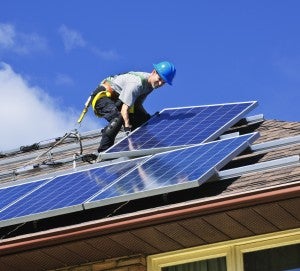 The recent headlines for solar power have been encouraging. According to the Solar Energy Industries Association (SEIA), the cost to install solar is declining as panel prices fell by 41% in the fourth quarter of 2012 versus the previous year. This helped US solar installations to grow by around 75% in 2012, from 1,855 megawatts (MW) in 2011 to 3,300 MW. (For comparison, the average coal plant in the US has a capacity of about 650 MW). Even better, they forecast that installations will continue to climb to an estimated 9,000 MW in 2016.
The recent headlines for solar power have been encouraging. According to the Solar Energy Industries Association (SEIA), the cost to install solar is declining as panel prices fell by 41% in the fourth quarter of 2012 versus the previous year. This helped US solar installations to grow by around 75% in 2012, from 1,855 megawatts (MW) in 2011 to 3,300 MW. (For comparison, the average coal plant in the US has a capacity of about 650 MW). Even better, they forecast that installations will continue to climb to an estimated 9,000 MW in 2016.
Unfortunately, lack of investment capital may be a barrier to realizing this vision. If we do not have enough funding, these projects will never be built. Bloomberg New Energy Finance forecasts that the industry will need $3.1 billion of equity investment in 2013, compared to $1.8 billion in 2012. Environmental Defense Fund (EDF) is committed to helping expand the roster of investors in solar projects, as investing in these projects is often not only highly profitable but also a major contribution to the sustainability of our planet.
Large investors have developed two strategies to invest in solar projects. The traditional method is to make investments in large, utility scale projects. More recently, residential solar developers have created funds for investors to take stakes in a large number of residential and small commercial projects. The latter strategy has made ‘no-money down’ solar available for homeowners who do not have the upfront capital to purchase solar systems, which can cost up to $15,000 or more.
Unfortunately, these investment strategies can be quite complex and are generally attractive only for corporations and certain wealthy individuals. To understand why, we need to explore the tax incentives for solar investors. The federal government provides tax breaks for solar investors to accelerate deals, develop a robust market that is expected to lower costs over time and allow investors to capture part of the societal benefit of avoiding development of more fossil fuel power plants. EDF believes that this is a very good idea.
The downside, however, of using the tax code to influence investment decisions is that investors who do not pay taxes generally do not care about taxes. The vast majority of institutional investors – such as pension funds, mutual funds and hedge funds – do not directly pay taxes and cannot take advantage of these tax breaks. To make matters worse, most individuals are also unable to capture the full tax benefit. As a result, investing in these types of solar projects tends to work well only for profitable corporations that pay taxes and for very wealthy individuals who also receive income from real estate or oil and gas projects, among others.
The roster of investors is currently dominated by the largest banks including JP Morgan, Wells Fargo, Citi, Goldman Sachs and US Bank. Google is also a major participant. Despite sitting on $1.7 trillion of cash that earns almost no returns, other non-financial corporations generally do not invest in this market.
 Solar investment returns are very attractive and projects often yield more than a 10% return on investment (ROI)—provided you are an investor than can utilize the tax benefits. These numbers are attractive when compared to investments in, for example, money markets, where returns barely cover management fees or two-year notes (which might pay 1%). Even the average ‘junk’ bond pays only about 5.5%. The great returns on solar investments are indicative of how little money is available for this market. If solar power demand continues its upward trajectory, this problem may only get worse.
Solar investment returns are very attractive and projects often yield more than a 10% return on investment (ROI)—provided you are an investor than can utilize the tax benefits. These numbers are attractive when compared to investments in, for example, money markets, where returns barely cover management fees or two-year notes (which might pay 1%). Even the average ‘junk’ bond pays only about 5.5%. The great returns on solar investments are indicative of how little money is available for this market. If solar power demand continues its upward trajectory, this problem may only get worse.
While solar investments are illiquid (not easily convertible into cash) and have long maturities (life spans), the cash flows are front-loaded, meaning an investor will earn more in the early stages, and average lives can be as short as three to four years.
Based on discussions with a number of companies, we believe there are two primary reasons they avoid investment in these types of solar projects. First, these investments are complex and difficult to understand. Few companies have the resources to emulate Google and hire a team of professionals to execute deals. This is a problem that can be solved. In every investment market, most investors hire professional money managers to make decisions on their behalf. An example of this is a mutual fund. EDF has been in discussion with several market players in this space including Citi, JP Morgan, Greentech Capital and Clean Energy Advantage. Each of these firms are pursuing strategies to either manage money on behalf of solar investors and/or to allow these investors to co-invest in their deals.
The second barrier for companies is the belief that investing in solar power is not aligned with their core mission. We respectfully disagree. Investing in solar projects can be a highly-profitable way to further increase a company’s commitment to sustainability. Most forward thinking companies are already working to increase their sustainable practices by reducing energy usage, recycling their waste and encouraging their employees to carpool or use public transportation, among others – and investing in solar energy is a cost-effective tool to add to the list.
Solar investments can also positively contribute to the company’s image and customer relationships. Honda recently committed to invest $65 million of their cash in solar projects developed by a major solar installer. Some of the money will go to financing panels on the rooftops of dealers, which should enhance their image while reducing electric bills. The remainder will be used to finance projects on the rooftops of Honda owners who will receive a discount. From Honda’s perspective, they get a great return on their investment, lower dealer electric bills and, most importantly, a stronger bond with customers. This is smart business and we hope to see more deals like this in the future.
EDF is planning an effort to reach out to potential solar investors to make the environmental case for investing in solar and other renewable projects. After all, investing in solar energy helps spur economic development, create American jobs, allow for energy independence and lessen our carbon footprint.
Disclaimer: Please note that EDF is not investment financial advisor and does not provide investment advice. We are not able to provide guidance on the financial merits or risks associated with any investment opportunity, nor do we have views on the relative merits of project proposals, financial partners or developers. EDF is an environmental nonprofit organization that has no financial interest or participation in these investments. We are not receiving any referral fees or financial participation in these projects. Potential investors should seek counsel from their tax, legal and investment advisors on the suitability of any investment vehicle. Finally, my wife is a proud employee of SolarCity, a leading solar installer.










3 Comments
Brad,
Excellent piece!
It is easier for investors to get into fossil fuel investing since the law favors such investing over similar investments in renewable investments. Fossil fuel investors can use Master Limited Partnerships (MLP) as well as ETFs and Funds based on MLPs. Renewable investors cannot.
Thus, it seems to me those interested in increasing investments in solar should, among other things, support efforts to convince Congress to expand the MLP and REIT laws to cover renewables.
The Pew Charitable Trusts recently wrote an excellent article about this on their CleanEnergy site.
Government even give subsidies to solar panel use, this for the promotion of solar panels but big brands should also come forward and promote solar energy uses not as charity but as a investment option.